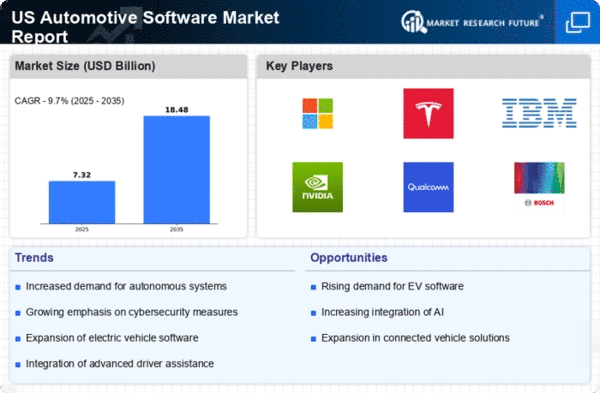Regulatory Compliance and Standards
the automotive software market is increasingly shaped by regulatory compliance and standards set by government agencies.. In the US, regulations regarding emissions, safety, and data privacy are becoming more stringent, compelling manufacturers to invest in software solutions that ensure compliance. The market for automotive software is projected to grow as companies seek to develop systems that meet these evolving standards. For instance, the implementation of the National Highway Traffic Safety Administration's (NHTSA) guidelines on vehicle safety software is expected to drive innovation and investment in the automotive software market. This regulatory landscape not only shapes product development but also influences market dynamics, as compliance becomes a critical factor for success.
Growing Demand for Electric Vehicles
the automotive software market is significantly influenced by the growing demand for electric vehicles (EVs) in the United States.. As consumers increasingly prioritize sustainability and fuel efficiency, the shift towards EVs necessitates sophisticated software solutions for battery management, energy optimization, and vehicle-to-grid communication. The US EV market is expected to reach a valuation of $800 billion by 2030, with software playing a crucial role in enhancing vehicle performance and user experience. This transition not only drives innovation in automotive software but also encourages collaboration between traditional automakers and tech companies, further expanding the automotive software market.
Increased Focus on Vehicle Connectivity
The automotive software market is significantly impacted by the increased focus on vehicle connectivity. As vehicles become more integrated with mobile devices and cloud services, the demand for software that facilitates seamless communication is rising. In the US, the connected car market is expected to reach $200 billion by 2025, driven by consumer preferences for enhanced infotainment systems and real-time data access. This connectivity trend necessitates robust software solutions that ensure data security and user privacy, thereby creating opportunities for growth within the automotive software market. Manufacturers are investing in innovative software to enhance connectivity features, which is likely to shape the future of automotive technology.
Emergence of Over-the-Air Software Updates
The automotive software market is witnessing a transformation with the emergence of over-the-air (OTA) software updates. This technology allows manufacturers to remotely update vehicle software, enhancing functionality and security without requiring physical service visits. In the US, the adoption of OTA updates is projected to increase by 30% over the next five years, as consumers demand more seamless and efficient vehicle maintenance. This trend not only reduces operational costs for manufacturers but also improves customer satisfaction, thereby driving growth in the automotive software market. The ability to quickly address software issues and introduce new features is becoming a competitive advantage for automakers.
Integration of Advanced Driver Assistance Systems
The automotive software market is experiencing a notable surge due to the integration of Advanced Driver Assistance Systems (ADAS). These systems enhance vehicle safety and driving experience by utilizing software for features such as lane-keeping assistance, adaptive cruise control, and automatic emergency braking. In the US, the demand for ADAS is projected to grow at a CAGR of approximately 20% from 2025 to 2030. This growth is driven by increasing consumer awareness of safety features and regulatory mandates for enhanced vehicle safety. Consequently, automotive manufacturers are investing heavily in software development to meet these demands, thereby propelling the automotive software market forward.

















